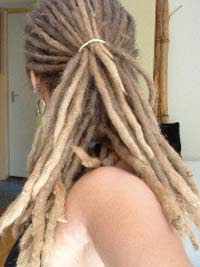Marley´s fight

lunes, 23 de marzo de 2009
domingo, 22 de marzo de 2009
Reggae Music

Is a Music genre first developed in Jamaica in the late 1960s.
While sometimes used in a broader sense to refer to most types of Jamaican Music the term reggae more properly denotes a particular music style that originated following on the development of ska and rocsteady. Reggae is based on a rhythmic style characterized by regular beats on the off- beat, known as the skank Reggae is normally slower than ska, and usually has accents on the first and third beat in each bar.
Reggae song lyrics deal with many subjects, including religion, love, sexuality, peace, relationships, poverty, injustice and other social and political issues.
Jah as Symbol Of God

Rastas say that Jah, in the form of the Holy Spirit, lives within the human, and for this reason they often refer to themselves as "I and I".
Rastas usually accept the Christian doctrine that God incarnated onto the Earth in the form of Jesus Christ to give his teachings to humanity. However, they often feel his teachings were corrupted by Babylon Many Rastas, in accordance with their assertion that "word, sound is power", also object specifically to the English pronunciation of his name (/dʒi:zəs/) as impure, preferring instead to use the forms in Hebrew (Yehoshuah) or Amharic ('Iyesus).
Integral to the basic Rastafari world-view is that Jah, as the Messiah or Christ, was incarnated again, this time as the Ethiopian Emperor Haile Selassie (Ras Tafari). A few Rastas also claim that Melchizedeck an Old Testament figure, was a previous incarnation of Jah
Smoke Ganja (Cannabis)

For Rastas, smoking cannabis usually known as healing of the nation, ganja, or herb, is a spiritual act, often accompanied by Bible study; they consider it a sacrament that cleans the body and mind, heals the soul, exalts the consciousness, facilitates peacefulness, brings pleasure, and brings them closer to Jah. The burning of the herb is often said to be essential "for it will sting in the hearts of those that promote and perform evil and wrongs." By the 8th century, cannabis had been introduced by Arab traders to Central and Southern Africa, where it is known as dagga, and many Rastas say it is a part of their African culture that they are reclaiming. It is sometimes also referred to as "the healing of the nation", a phraseology adapted from Revelation 22:2. Smoking Ganja has become a stereotype among others, but while they do consider cannabis to have beneficial qualities, it is not compulsory to use it.
They hold that the smoking of cannabis enjoys Biblical sanction, and is an aid to meditation and religious observance.
Among Biblical verses Rastas quote as justifying the use of cannabis:
- 1 Genesis 1:11 "And God said, Let the earth bring forth grass, the herb yielding seed, and the fruit tree yielding fruit after his kind, whose seed is in itself, upon the earth: and it was so."
- Genesis 1:29 "And God said, Behold, I have given you every herb bearing seed, which is upon the face of all the earth, and every tree, in the which is the fruit of a tree yielding seed; to you it shall be for meat."
- 1 Proverbs 5:17 "Better is a dinner of herbs where love is, than a stalled ox and hatred therewith."
Dreadlocks

The wearing of Dreadlocks is very closely associated with the movement, though not universal among, or exclusive to, its adherents. Rastas maintain that dreadlocks are supported by Leviticus 21:5 ("They shall not make baldness upon their head, neither shall they shave off the corner of their beard, nor make any cuttings in the flesh.") and the Naziritevow in Numbers 6:5 ("All the days of the vow of his separation there shall no razor come upon his head: until the days be fulfilled, in the which he separated himself unto the LORD, he shall be holy, and shall let the locks of the hair of his head grow.").
Rastafari associate dreadlocks with a spiritual journey that one takes in the process of locking their hair (growing dreadlocks). It is taught that patience is the key to growing dreadlocks, a journey of the mind, soul and spirituality. Its spiritual pattern is aligned with the Rastafari movement. The way to form natural dreadlocks is to allow hair to grow in its natural pattern, without cutting, combing or brushing, but simply to wash it with pure water.
domingo, 1 de marzo de 2009
Characteristics...
- The Rastafary Religion believe in a black good,also called Jah.
- The rastas say that Jah, in the form of the holy spirit, He lives whithin the human, for this reason they often refer to themselves as "I and I.
- characteristics of Rastafary include the spiritual use of cannabis or marihuana, as way to meditation.
- The name Rastafary comes from Ras(literally "head", and ethiopian title equivalent to duke), and tafari makonnen, the pre - coronation name of hailé selassié I.
- This Religion don´t allow that his believers can comb his hair, they can´t stop the growth of his hair. Because many rastas make use of dreadlocks.
Many Rastas don´t make use of dreadlocks, neither use the cannabis as way of meditation, but equally they´re Rastas.


